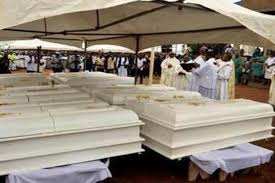
Trump: Chinasa Nworu Accuses Northern Nigerian Leaders of Enabling Terrorism Ravaging Nigeria Christians
Abuja, Nigeria – November 3, 2025
A fresh wave of controversy erupted on social media on Monday after Mazi Chinasa Nworu, a high-ranking member of the Indigenous People of Biafra (IPOB), accused influential Northern Nigerian leaders of openly showing “strong support for terrorists” responsible for years of widespread massacres against Christian communities across the country.
In a post shared across his social media handles, Nworu pointed out that several top Northern political, religious, and opinion leaders have, through their public remarks and policy positions, demonstrated complicity in the deadly terrorism that has claimed tens of thousands of Christian lives, destabilized the country, and impeded its sovereignty.
“The Northern leaders were all in support of the Christian genocide. From their utterances and actions, they’re complicit in the killings and have shown strong support for those terrorists,” Nworu wrote.
Attached to his post were screenshots of past newspaper headlines and public statements by prominent Northern figures, which critics say reveal a pattern of sympathetic posturing toward terrorist groups.
Among the documented statements were:
A quote attributed to politician Adamu Garba, calling Boko Haram and Fulani bandits “Northern Nigeria freedom fighters.”
A headline from Sahara Reporters quoting Islamic cleric Sheikh Ahmad Gumi, warning Northerners “Don’t vote for politicians who will attack or kill bandits; they are our warriors in the forests.”
A BBC report quoting the Sultan of Sokoto “condemns Boko Haram crackdown,” adding that “the spiritual leader of Nigeria’s Muslims, has condemned the military crackdown against the Islamist Boko Haram sect.”
A Nigerian Presidency statement on Daily Sun newspaper insisting “killer herdsmen are not terrorists,” despite international classifications and unabated attacks on Christian communities and the forceful takeover of their lands.

Nworu also shared a screenshot of an old post by Bashir Ahmad, a former presidential aide, in which Ahmad wrote: “I can’t pretend or keep silent. I support the death penalty for blasphemy. That’s my belief, and I do not and will never support #SaveKanoNine.”
The #SaveKanoNine campaign emerged in 2015 after nine non-Muslim young men from Kano were sentenced to death by a Sharia court for alleged blasphemy against Islam. The verdict sparked national and international outrage, with human rights groups condemning the ruling as a violation of freedom of expression and religion.
However, figures like Bashir Ahmad, who as at that time was a presidential aid, publicly opposed the campaign, insisting that the death penalty was justified under Islamic law.
These resurfaced statements have intensified long-standing accusations that powerful Northern elites are shielding, legitimizing, or indirectly sponsoring extremist groups responsible for mass killings, forced displacement, and assaults on Christian farming villages.
The timing of these renewed accusations is significant: they come amid the Nigerian government’s attempt to reject U.S. President Donald Trump’s announcement that he is prepared to “obliterate the terrorists responsible for the Christian genocide” and has directed the Pentagon to draft contingency plans.
While Christian groups and activists have welcomed Trump’s stance, Nigeria’s political leadership, particularly from the North has responded with hostility, framing any foreign intervention as a threat to the country’s “territorial integrity.”
Observers note that this sudden sensitivity stands in stark contrast to years of silence or dismissive rhetoric when Fulani terrorists operated freely, slaughtering civilians and overrunning communities.
Nworu’s post reignited public debate over whether the resistance to foreign involvement stems from a desire to protect sovereignty, or to protect entrenched interests tied to groups destabilizing the region.
For many Nigerians, especially Christians who have suffered repeated attacks, the backlash against Trump’s proposed intervention raises deeply troubling questions.
“They were never shouting about sovereignty when terrorists they told us were foreigners were butchering women and children,” Sochima Mbanali, a South Africa based activist said. “But the moment a world power offers to end the killings, suddenly they remember territorial integrity. Who are they defending, Nigerians or the killers?”
The resurfaced statements and mounting allegations are likely to fuel global scrutiny of Nigeria’s handling of terrorism and its reluctance to accept external assistance.
As the U.S. considers taking action, the divide between the Nigerian government’s position and the lived reality of victims widens, and accusations of state-enabled terror continue to gain traction both domestically and in the diaspora.